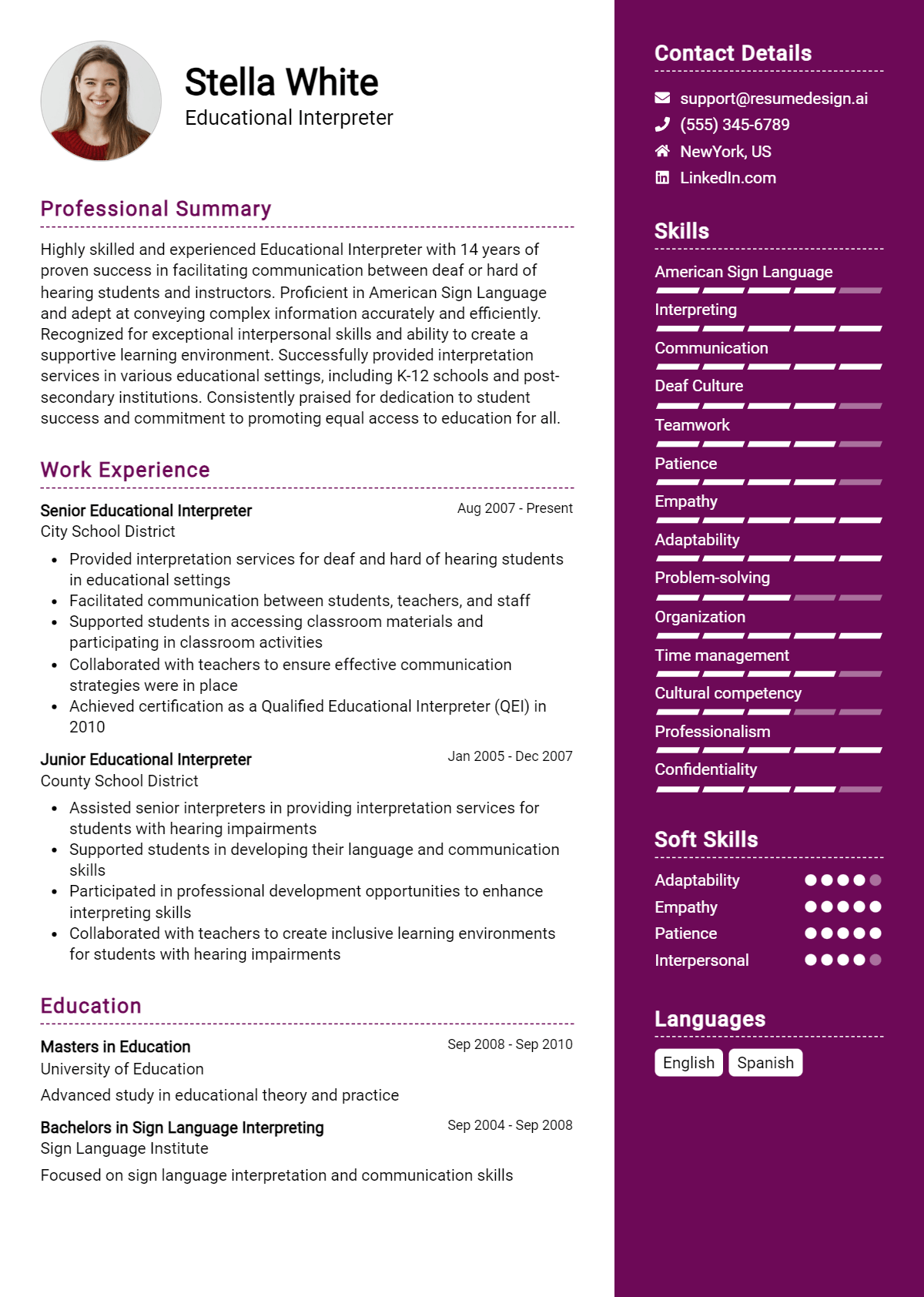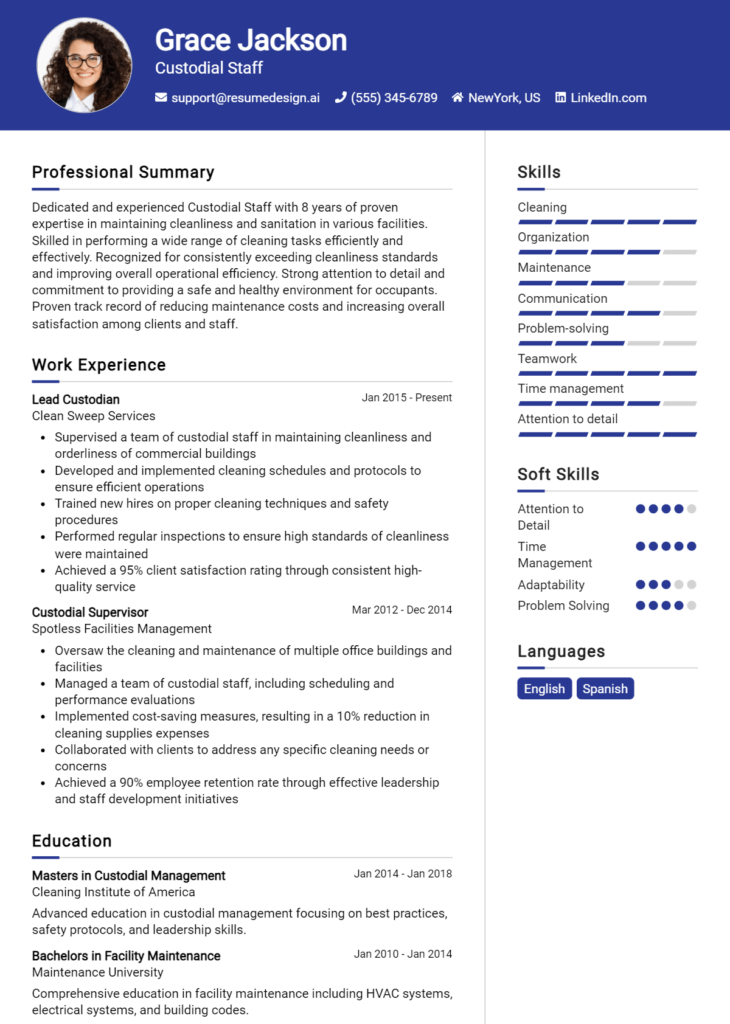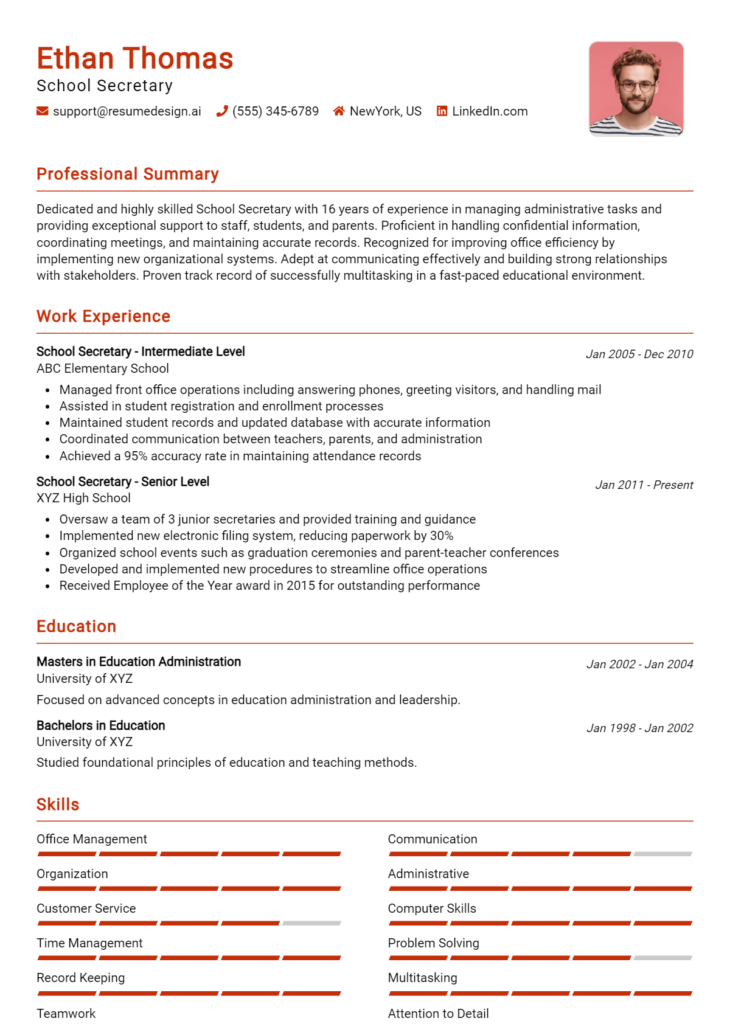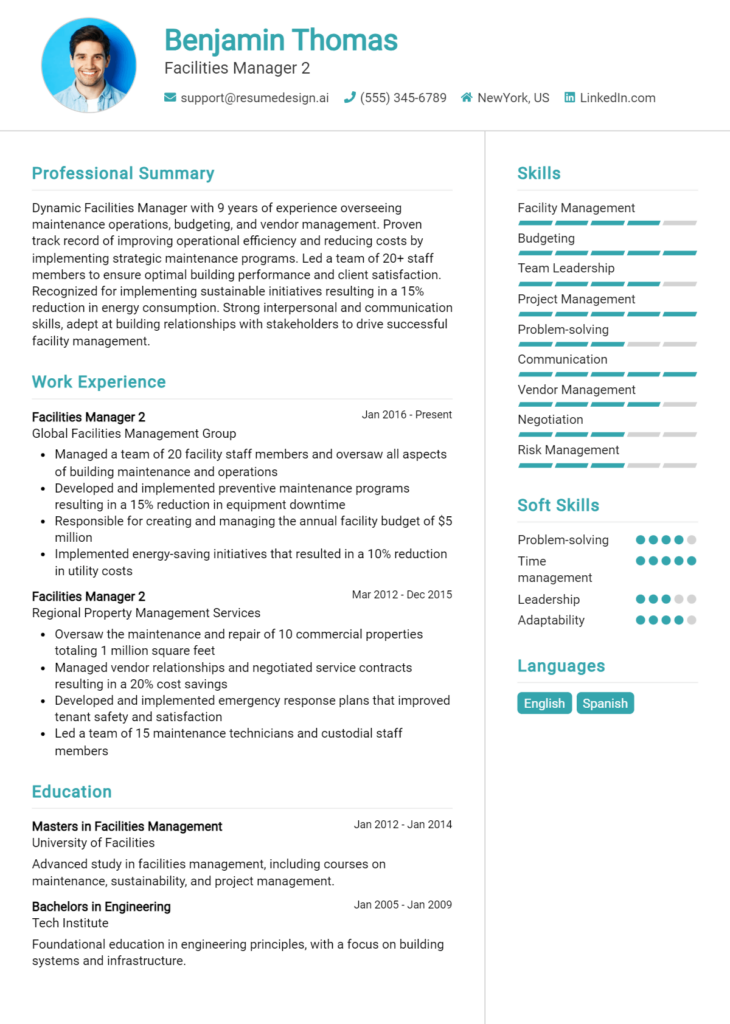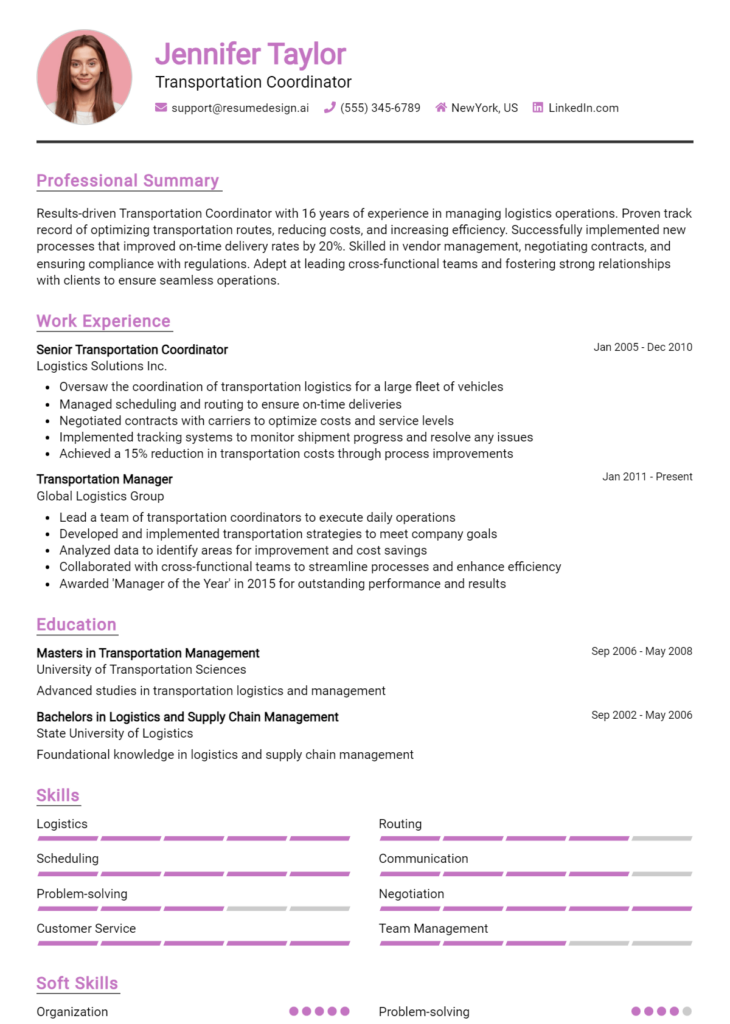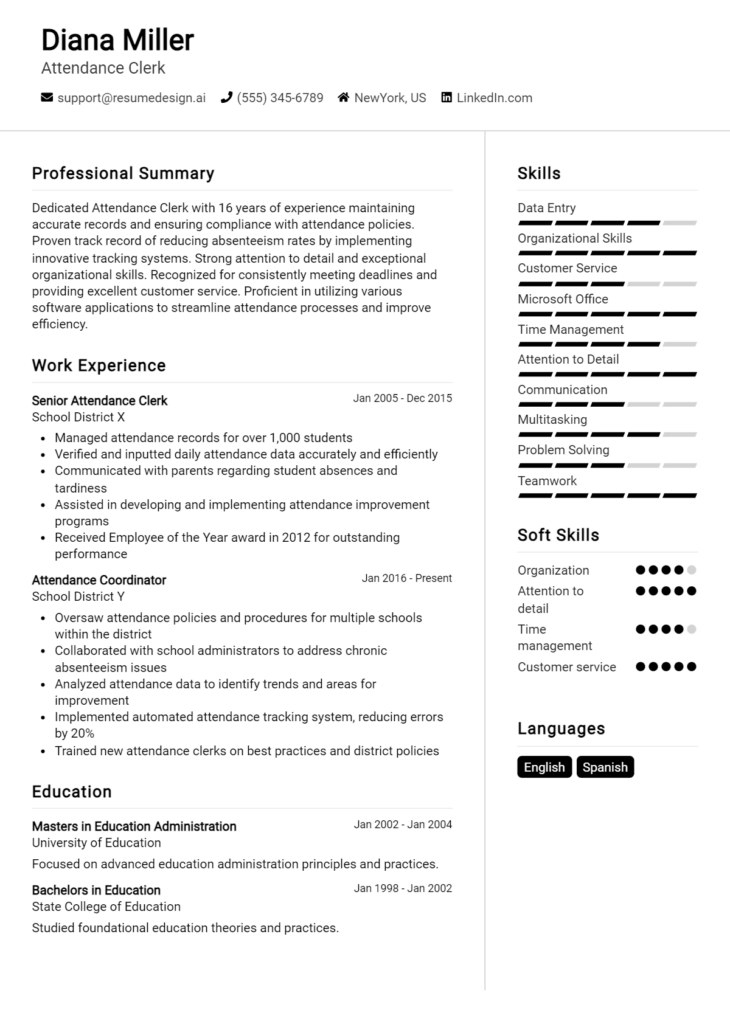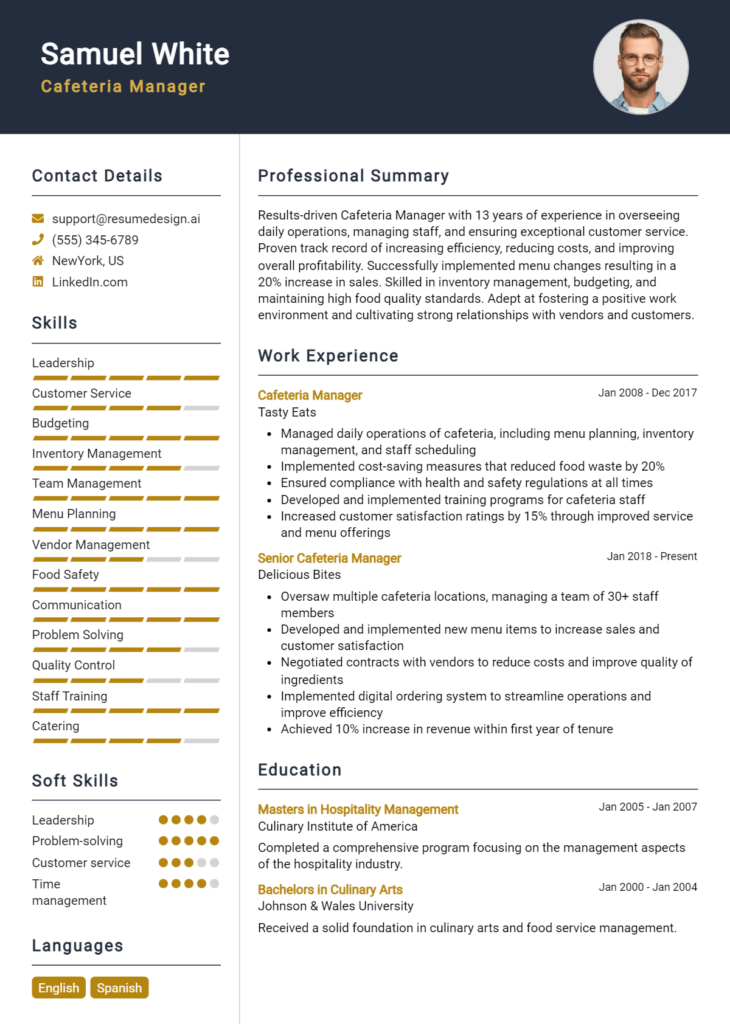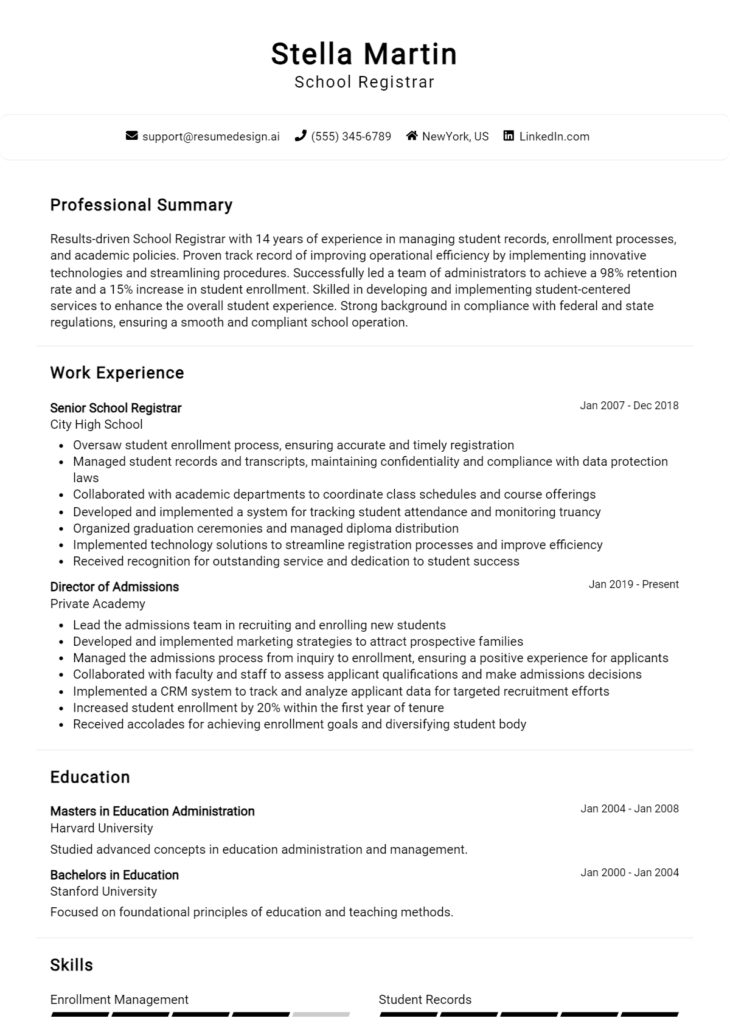Educational Interpreter Core Responsibilities
As an Educational Interpreter, professionals play a crucial role in bridging communication gaps between students, teachers, and administrative staff, ensuring that all parties can engage effectively in the educational process. Key responsibilities include providing real-time interpretation of spoken language into sign language and vice versa, facilitating access to educational content, and supporting students with special needs. Essential skills include technical proficiency in sign language, strong operational awareness, and exceptional problem-solving abilities that enhance the learning environment. These competencies significantly contribute to the organization's overall goals by promoting inclusivity and accessibility. A well-structured resume can effectively showcase these qualifications, highlighting the candidate's experience and skills to prospective employers.
Common Responsibilities Listed on Educational Interpreter Resume
- Provide accurate and clear interpretation of classroom lectures and discussions.
- Facilitate communication between students, teachers, and support staff.
- Interpret educational materials and resources for deaf and hard of hearing students.
- Adapt interpreting style to suit various learning environments and needs.
- Maintain confidentiality and professionalism in all interactions.
- Collaborate with educators to develop effective communication strategies.
- Attend training sessions and workshops to enhance interpreting skills.
- Assist in the implementation of Individualized Education Programs (IEPs).
- Provide support during meetings and parent conferences.
- Evaluate and adapt to the changing needs of students and educational settings.
- Monitor and assess student comprehension and engagement.
- Maintain knowledge of relevant laws and regulations regarding accessibility in education.
High-Level Resume Tips for Educational Interpreter Professionals
In the competitive field of educational interpretation, a well-crafted resume is not just a document; it’s your first opportunity to make a lasting impression on potential employers. As an Educational Interpreter, your resume must effectively showcase both your skills and achievements, reflecting your ability to bridge communication gaps in educational settings. With hiring managers often sifting through numerous applications, your resume needs to stand out by highlighting your unique qualifications and experiences. This guide will provide practical and actionable resume tips specifically tailored for Educational Interpreter professionals, ensuring you present yourself as the ideal candidate for the role.
Top Resume Tips for Educational Interpreter Professionals
- Tailor your resume to the specific job description by using relevant keywords and phrases that align with the requirements of the position.
- Highlight your experience in educational settings, emphasizing any direct work with students who are deaf or hard of hearing.
- Quantify your achievements by including specific metrics, such as the number of students served or improvements in communication outcomes.
- Showcase your proficiency in various sign languages and any certifications you hold, such as RID or EIPA.
- Include relevant training or workshops you have completed that enhance your skills as an interpreter.
- Demonstrate your understanding of educational policies and practices that impact the role of an Educational Interpreter.
- List any experience you have with assistive technology and how it has been utilized to support student learning.
- Incorporate testimonials or endorsements from educators or administrators to provide credibility to your skills and experiences.
- Keep your resume concise, ideally one page, focusing on the most relevant information that pertains to the job you are applying for.
- Utilize a clean and professional format to enhance readability and make a positive impression.
By implementing these tips, you can significantly increase your chances of landing a job in the Educational Interpreter field. A targeted and polished resume will not only capture the attention of hiring managers but also effectively communicate your qualifications and readiness to contribute to the educational success of your students.
Why Resume Headlines & Titles are Important for Educational Interpreter
In the competitive field of educational interpreting, a well-crafted resume headline or title can serve as a powerful tool for candidates. These succinct phrases are vital because they provide hiring managers with an immediate impression of a candidate’s qualifications and suitability for the role. A strong headline grabs attention and encapsulates key skills or experiences, making it easier for recruiters to identify qualified applicants quickly. To maximize impact, the headline should be concise, relevant, and closely aligned with the specific educational interpreter position being pursued.
Best Practices for Crafting Resume Headlines for Educational Interpreter
- Keep it concise: Aim for one to two impactful phrases.
- Be role-specific: Use keywords that directly relate to educational interpreting.
- Showcase key strengths: Highlight your most relevant skills or experiences.
- Use action-oriented language: Start with strong verbs to convey your expertise.
- Avoid jargon: Use clear language that is easily understood by all readers.
- Tailor for each application: Customize the headline for the specific job to which you are applying.
- Include relevant certifications or qualifications: Mention any specific credentials that enhance your qualifications.
- Emphasize contributions: Indicate how you can add value to the educational setting.
Example Resume Headlines for Educational Interpreter
Strong Resume Headlines
Certified Educational Interpreter with 5+ Years of Experience in K-12 Settings
Skilled ASL Interpreter Specializing in Inclusive Education Practices
Experienced Educational Interpreter Committed to Enhancing Student Learning
Weak Resume Headlines
Interpreter looking for work
Education professional seeking new opportunities
The strong headlines are effective because they clearly convey the candidate’s relevant experience and specialization, making it easy for hiring managers to see their value at a glance. In contrast, the weak headlines fail to impress due to their vagueness and lack of specificity, which do not highlight the unique qualifications and strengths of the candidate. In a competitive job market, these clear and targeted headlines can make all the difference in capturing the attention of potential employers.
Writing an Exceptional Educational Interpreter Resume Summary
A well-crafted resume summary is crucial for an Educational Interpreter as it serves as a snapshot of the candidate's skills, experience, and accomplishments, quickly grabbing the attention of hiring managers. In a competitive job market, a strong summary highlights the interpreter's ability to facilitate communication, enhance learning experiences, and support students with diverse needs. An impactful summary is concise, tailored to the specific job description, and showcases the candidate's unique qualifications, making it a vital component of a successful resume.
Best Practices for Writing a Educational Interpreter Resume Summary
- Keep it concise: Aim for 3-5 sentences that capture the essence of your qualifications.
- Quantify achievements: Use numbers to demonstrate the impact you’ve made in previous roles.
- Focus on relevant skills: Highlight skills such as ASL proficiency, cultural competency, and educational support.
- Tailor the summary: Customize your summary for each job application by aligning it with the job description.
- Use action verbs: Start sentences with strong action verbs to convey confidence and capability.
- Showcase unique qualifications: Mention any specialized training or certifications that set you apart.
- Emphasize collaboration: Highlight your ability to work with educators, students, and parents effectively.
- Maintain professionalism: Use a professional tone that reflects your commitment to the role.
Example Educational Interpreter Resume Summaries
Strong Resume Summaries
Dedicated Educational Interpreter with over 5 years of experience facilitating communication for deaf and hard-of-hearing students in K-12 settings. Successfully improved student engagement by 30% through the use of interactive ASL techniques and tailored instructional support.
Certified ASL Interpreter with a Master’s degree in Education, specializing in inclusive classroom environments. Achieved a 95% satisfaction rate among teachers and parents by effectively bridging communication gaps, resulting in improved academic performance for students.
Dynamic Educational Interpreter with a proven track record of supporting diverse learners in classroom settings. Trained in various communication methodologies, I increased student participation by 40% over two academic years, ensuring equitable access to educational resources.
Weak Resume Summaries
Experienced interpreter looking for a position in education. I have worked in various settings and can communicate well.
I am an Educational Interpreter with some background in ASL and working with students. I hope to find a suitable opportunity.
The strong resume summaries are considered effective because they provide specific details about the candidate's experience, quantifiable achievements, and relevant skills that align with the Educational Interpreter role. In contrast, the weak summaries lack specificity, measurable outcomes, and fail to convey the candidate's unique qualifications, making them less appealing to hiring managers.
Work Experience Section for Educational Interpreter Resume
The work experience section of an Educational Interpreter resume is vital as it serves as a testament to the candidate's practical skills and professional background. This section not only highlights the candidate's technical abilities in interpreting but also showcases their capacity to manage teams and deliver high-quality services in educational settings. By quantifying achievements and aligning experiences with industry standards, candidates can effectively demonstrate their value to potential employers and distinguish themselves in a competitive job market.
Best Practices for Educational Interpreter Work Experience
- Highlight specific technical skills related to interpreting, such as proficiency in sign language and understanding of educational jargon.
- Quantify achievements when possible, such as the number of students assisted or improvements in student comprehension scores.
- Emphasize collaboration with educators, administrators, and students to showcase teamwork and communication skills.
- Use action verbs to convey your contributions effectively, such as "facilitated," "coordinated," or "implemented."
- Tailor your experience to align with the job description, emphasizing relevant duties and successes.
- Include any certifications or specialized training that enhances your qualifications as an interpreter.
- Showcase adaptability in various educational settings, such as classrooms, extracurricular activities, or online environments.
- Maintain clarity and conciseness in descriptions to ensure readability and impact.
Example Work Experiences for Educational Interpreter
Strong Experiences
- Provided interpretation services for over 100 students with hearing impairments, resulting in a 30% increase in classroom participation and engagement.
- Collaborated with a team of five educators to develop inclusive lesson plans, enhancing accessibility and understanding for all students.
- Trained and mentored junior interpreters, improving team performance and cohesion, evidenced by a 25% reduction in miscommunication incidents.
- Implemented a new visual aids system that increased student comprehension by 40% during interactive learning sessions.
Weak Experiences
- Worked as an interpreter in various settings.
- Assisted students with interpreting during class.
- Helped with communication in a school environment.
- Performed duties as assigned by teachers and administrators.
The examples provided are considered strong because they incorporate specific, quantifiable outcomes that demonstrate the candidate's impact on student engagement and learning. They highlight technical leadership and collaboration with educational professionals, showcasing the candidate's ability to enhance the educational experience. Conversely, the weak experiences lack detail and measurable achievements, making them less compelling and failing to effectively communicate the candidate’s contributions and skills in a meaningful way.
Education and Certifications Section for Educational Interpreter Resume
The education and certifications section of an Educational Interpreter resume is crucial as it provides a snapshot of the candidate's academic background and demonstrates their commitment to professional development within the field. This section not only showcases relevant degrees but also highlights industry-specific certifications and any specialized training that enhances the candidate's qualifications. By effectively outlining relevant coursework and continuous learning efforts, candidates can significantly boost their credibility and align themselves with the expectations of prospective employers in the educational interpreting landscape.
Best Practices for Educational Interpreter Education and Certifications
- Include your highest degree first, followed by relevant certifications.
- List certifications that are recognized within the educational interpreting field, such as RID (Registry of Interpreters for the Deaf) certification.
- Provide details about relevant coursework that aligns with educational interpreting, such as ASL linguistics or special education.
- Highlight any specialized training related to your interpreting skills, such as workshops on interpreting in educational settings.
- Keep the section organized and easy to read, using bullet points for clarity.
- Update this section regularly to reflect newly obtained qualifications or trainings.
- Consider including a brief description of each certification to clarify its relevance and significance.
- Use a consistent format for listing degrees and certifications to enhance professionalism.
Example Education and Certifications for Educational Interpreter
Strong Examples
- Bachelor of Arts in American Sign Language Interpreting, University of XYZ, 2020
- RID Certified Interpreter, National Certification, 2021
- Specialized Training in Educational Interpreting, ABC Training Institute, 2022
- Coursework in Deaf Culture and Community, University of XYZ, 2019
Weak Examples
- Associate Degree in General Studies, Community College, 2015
- Certification in Basic Sign Language, Online Course, 2018
- High School Diploma, Anytown High School, 2010
- Outdated CPR/First Aid Certification, 2015 (expired)
The strong examples listed highlight relevant degrees, recognized certifications, and specialized training that directly support the role of an Educational Interpreter. These qualifications demonstrate a commitment to the field and an understanding of its specific requirements. In contrast, the weak examples reflect outdated or irrelevant qualifications that do not contribute to the candidate's credibility or alignment with the Educational Interpreter role, potentially diminishing their appeal to hiring managers.
Top Skills & Keywords for Educational Interpreter Resume
In the field of educational interpreting, possessing the right skills is crucial for creating an inclusive learning environment for students who are deaf or hard of hearing. An effective Educational Interpreter not only bridges communication between students and educators but also fosters an atmosphere that supports academic success and social interaction. A well-crafted resume highlighting relevant skills can significantly enhance your chances of landing a job in this rewarding profession. Job seekers should emphasize both hard and soft skills that showcase their capabilities and adaptability in various educational settings.
Top Hard & Soft Skills for Educational Interpreter
Soft Skills
- Active Listening
- Communication Skills
- Empathy
- Patience
- Adaptability
- Team Collaboration
- Problem-Solving
- Cultural Sensitivity
- Time Management
- Emotional Intelligence
- Conflict Resolution
- Flexibility
- Attention to Detail
- Positive Attitude
- Interpersonal Skills
- Creativity
- Assertiveness
Hard Skills
- American Sign Language (ASL) Proficiency
- Interpreting Techniques
- Knowledge of Deaf Culture
- Transliteration Skills
- Note-taking Skills
- Classroom Management Techniques
- Familiarity with Educational Terminology
- Voice-to-Sign Interpretation
- Sign-to-Voice Interpretation
- Use of Interpreting Equipment
- Familiarity with IEP (Individualized Education Program) Processes
- Understanding of Accessibility Laws
- Technology Proficiency (e.g., video relay services)
- Experience with Specialized Subjects (e.g., math, science)
- Crisis Management Skills
- Training in Special Education
- Certification in Interpreting
By focusing on these essential skills and effectively presenting your work experience, you can create a powerful resume that stands out to potential employers in the educational interpreting field.
Stand Out with a Winning Educational Interpreter Cover Letter
Dear Hiring Manager,
I am excited to apply for the Educational Interpreter position at your institution, as advertised on your website. With over five years of experience in interpreting for diverse educational settings and a profound commitment to facilitating effective communication, I am confident in my ability to support students who are Deaf and Hard of Hearing. My background in American Sign Language (ASL) and my proactive approach to fostering inclusive learning environments enable me to contribute positively to your team.
In my previous role at [Previous Institution], I provided interpretation services for a variety of subjects, ranging from mathematics to literature, ensuring that all students had equal access to the curriculum. I collaborated closely with teachers, students, and parents to create an accommodating atmosphere that promotes engagement and understanding. My ability to convey complex information in a clear and accessible manner has been instrumental in enhancing students' learning experiences and academic performance.
I am particularly drawn to your institution's commitment to inclusivity and excellence in education. I am eager to bring my skills in real-time interpreting, cultural competency, and advocacy to your team. I am dedicated to continually improving my skills through professional development opportunities, and I am excited about the possibility of contributing to your mission of empowering all students to succeed.
Thank you for considering my application. I look forward to the opportunity to discuss how my experience and passion for educational interpreting can make a meaningful impact at your institution.
Sincerely,
[Your Name]
[Your Contact Information]
Common Mistakes to Avoid in a Educational Interpreter Resume
When crafting a resume for an Educational Interpreter position, it's crucial to present your skills and experience effectively. However, many applicants fall into common pitfalls that can undermine their chances of standing out to potential employers. Understanding these mistakes can help you create a compelling resume that highlights your qualifications and suitability for the role. Here are some common mistakes to avoid:
Ignoring Keywords: Failing to include relevant keywords from the job description can result in your resume being overlooked by applicant tracking systems (ATS) and hiring managers.
Vague Job Descriptions: Using generic job descriptions instead of specific examples of your responsibilities and achievements can make your experience seem less impactful. Be sure to detail your role in each position.
Omitting Relevant Certifications: Not listing certifications, such as RID (Registry of Interpreters for the Deaf) or educational interpreter training, can leave employers questioning your qualifications.
Inconsistent Formatting: Using inconsistent fonts, sizes, or styles can make your resume look unprofessional. Aim for a clean, uniform format that enhances readability.
Lack of Tailoring: Submitting the same resume for every application without tailoring it to the specific requirements of each job can diminish your chances of catching the employer's attention.
Overloading with Jargon: While industry-specific terminology can demonstrate your expertise, overloading your resume with jargon can confuse readers. Strive for clarity and balance.
Neglecting Soft Skills: Educational interpreters need strong communication and interpersonal skills. Failing to highlight these soft skills can make your resume less compelling.
Skipping a Summary Statement: A well-crafted summary statement at the beginning of your resume can provide a quick overview of your qualifications and set the tone for the rest of the document. Not including one may miss the opportunity to make a strong first impression.
Conclusion
As an Educational Interpreter, your role is vital in bridging communication between students who are deaf or hard of hearing and their peers, educators, and the curriculum. This position requires not only proficiency in sign language but also a deep understanding of educational environments and cultural nuances. The key points covered in this article include the essential skills needed for the role, the importance of ongoing professional development, and the impact of effective interpreting on student success.
To ensure you stand out in this competitive field, it's important to have a polished resume that highlights your qualifications, experiences, and unique skills. Take a moment to review your Educational Interpreter resume and make any necessary updates. Consider utilizing tools available online, such as resume templates, which can help you structure your resume effectively. You might also explore the resume builder for a user-friendly way to create a professional-looking resume tailored to your needs.
Additionally, reviewing resume examples can provide inspiration and insight into how to present your experiences effectively. Don’t forget the importance of a strong first impression with a compelling cover letter; check out the cover letter templates available to guide you in crafting your message.
Take the next step in your career by refining your resume today!

